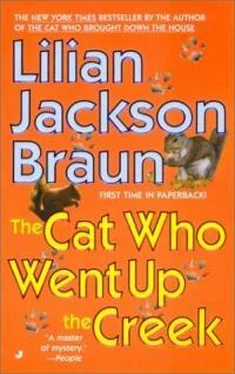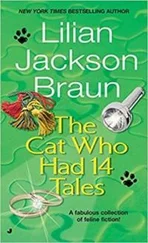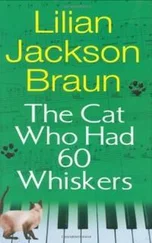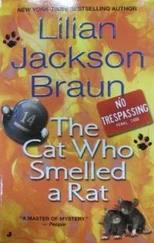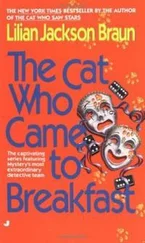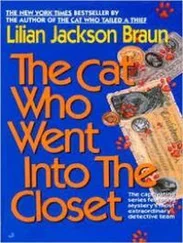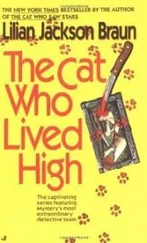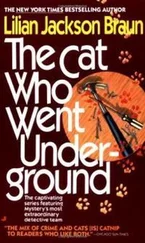Then he walked up the hill for breakfast at the inn, taking his Friday column to be faxed.
Nick Bamba said, “I’ll put it on the machine right away, Qwill.”
“Not so fast! The deadline is noon. If it arrives early, some itchy-fingered editor with a blue pencil will get the urge to change a few words. It’s better for the copy to arrive when they’re beginning to worry about the thousand-word hole on page two. . . . How’s Lori, Nick?”
“Jumping for joy, now that Mrs. Truffle has moved out.”
It flashed through Qwilleran’s mind that Mrs. Truffle had cast the dark shadow over the inn—not the ill-fated Elsa Limburger. He asked, “Who are the quiet people in Cabin Two?”
“The Thompsons. She’s recuperating from an illness. He goes out deep-sea fishing on the charter boats every day. They get big lake trout and have it cleaned, frozen and shipped to one’s home address. At least, he says that’s the way it works. . . . Here’s another postcard, Qwill.”
It was a view of the Governor’s Palace at Colonial Williamsburg. Qwilleran dropped it in his pocket with a show of apathy. “What’s today’s breakfast special, Nick?”
“Frittata with Italian sauce. Very good!”
“As an old friend, would you tell me it was good if it wasn’t?” Qwilleran asked to tease him.
“If you don’t like it, send it back to the kitchen, and you can have corn flakes on the house!”
In the dining room Qwilleran cast a quick glance at Polly’s postcard:
Dear Qwill—The antique dealer took us to lunch today. Charming man. Called home. Cats not eating well. Could you drop in and cheer them up?
Love, Polly
Qwilleran huffed into his moustache. Polly’s male cat had only recently learned to tolerate him, and Black Creek was halfway across the county from Indian Village, where Brutus and Catta lived, but . . .
The server came to take his order, and he asked about the breakfast special.
She shuffled her feet and looked dubious. “Well . . . my last customer thought the sausage was too spicy, and the one before that said the frittata was dry, but that was only their opinion.”
Qwilleran had ham and eggs and left her the usual twenty percent plus something extra for honesty.
Back in Cabin Five, he phoned the official historian for Moose County. Homer Tibbitt, a nonagenarian, lived with his wife, a young eighty-eight, in a retirement village, the Ittibittiwassee Estates.
Rhoda answered the phone and said, “Speak of the devil! . . . We were just talking about you at breakfast. Homer’s having his after-breakfast nap right now—”
“Who’s that? Who’s that?” came a high-pitched voice in the background.
“The media,” she said as she handed Homer the cordless phone.
Affably the two men exchanged derogatory remarks.
“You old rascal! How come you take a nap in the middle of the morning?”
“You sneaky pup! Calling my wife when you think I’m asleep!”
“How do you like this weather?”
“What do I know about weather? She won’t let me go out.”
“I hear your knee replacement was a big success, Homer.”
“So good I’m thinking of having my funny bone replaced, if you’re the donor.”
Only after the required banter did Qwilleran pose the question: Has Moose County ever had a gold rush?
“Well . . .” Homer mused as he retrieved pertinent facts, “there was a Poor Man’s Gold Rush in the nineteenth century before they discovered the real gold: coal and lumber; that’s where the fortunes were made.
“In my own lifetime there’s been periodic hysteria over a gold strike, but it never amounted to anything. If you ask me, there’s more cold cash buried in coffee cans in people’s backyards than was ever—”
Rhoda snatched the phone. “Ask Mr. MacMurchie. He used to sell sluice boxes and panning equipment.”
Homer snatched it back again. “Ask Thornton Haggis. He used to take his boys panning.”
Without delay Qwilleran phoned the retired stonecutter and made an appointment for lunch. Thornton was one of the most savvy natives he had met since coming to the north country. Thorn, as he was called, had attended a university Down Below, majoring in art history before returning to manage the family’s monument works. After retirement he plunged into volunteer work—helping at the art center, assisting the sheriff’s department in spotting brush fires, and now playing the role of saloonkeeper in the forthcoming reenactment. It came as no surprise to Qwilleran that Thorn had been a gold prospector.
They agreed to meet at the Nasty Pasty in Mooseville; only a restaurant serving the best pasties in the county could risk such a name. Meanwhile, Qwilleran and the Siamese sat on the screened porch and enjoyed the sylvan quiet.
Koko chattered at an occasional squirrel who had come too close to his turf and pointed his ears toward the creek when he heard quacking. Qwilleran quickly harnessed him and took him for a shoulder-ride down to the water’s edge. Two ducks were gliding serenely followed by nine ducklings (he counted them) in perfect formation, the entire company turning left or right like a drill team.
A man’s voice said, “Only the females quack; the males go cluck-cluck.” It was Doyle Underhill from Cabin Three. “Is this the cat that got rid of Mrs. Truffle? We should give him a medal.”
The photographer was heading for the boat shed with his camera. “Do you like canoeing, Qwill? You’re welcome to come with me any time.”
“Unfortunately, Doyle, I had a traumatic experience while paddling along the shore of the big lake. A sudden offshore breeze spun the prow around to the north, and I was on my way to Canada a hundred miles away. There was nothing I knew to do until a sepulchral voice from nowhere told me to back-paddle. I made it safely back to shore but lost my taste for canoeing.”
“Sounds supernatural.”
“No, it was only my neighbor on the beach, a retired police chief with a bullhorn. . . . How’s the shooting up the creek?”
“Great! The other day I photographed a huge owl, taking off over my head like a bomber.”
“What do you do with your photos?”
“Sell a few to magazines and photo services.”
“Do you know about the photography show opening Sunday at the Pickax art center? They’re having a reception for the artist, John Bushland.”
“I see his byline all the time! He’s super! I didn’t know he lived around here.”
“You and Wendy should go and meet him, between two and five o’clock. He likes to be called Bushy because he’s losing his hair.”
“We’ll go. Thanks for the tip. Too bad you don’t like canoeing, Qwill. When I’m paddling up this creek I really feel one with nature.”
A few minutes later he was paddling quietly upstream without disturbing the ducks.
When Qwilleran arrived at the Nasty Pasty in Mooseville, Thornton Haggis was waiting in a corner booth, his generous shock of snow-white hair making him instantly visible.
“I see your wife hasn’t let you go to the barber recently.” Qwilleran said, pursuing their usual joke.
“I let her win the battle this time. I’m playing the saloonkeeper in the reenactment, and they think white hair will make the character look like a wholesome father figure.”
“How did you get involved?”
“Funny thing. When my boys were teens, they hated history. Now they’re two grown men with families and an active sand-and-gravel business, and they were the first to join the re-enactors. They talked me into it.”
The two men ordered the café’s famous pasty. Thornton said, “I like it because they make the crust with vegetable oil in the new way instead of lard in the old way, and they dice the meat up the old way instead of grinding it in the new way. They use local potatoes and season the filling with sage and onion and a little butter.”
Читать дальше
